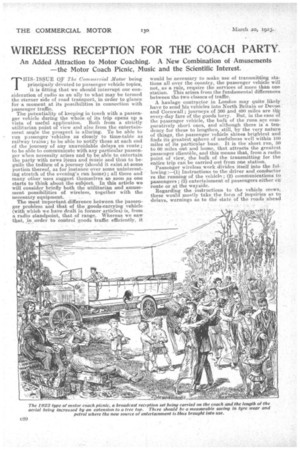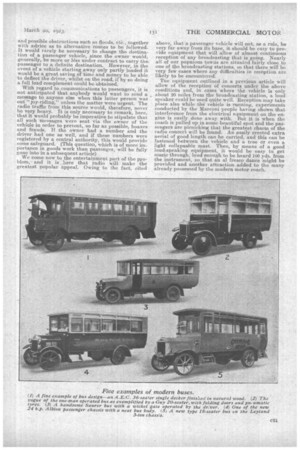WIRELESS RECEPTION FOR THE COACH PARTY.
Page 12

Page 13

If you've noticed an error in this article please click here to report it so we can fix it.
An Added Attraction to Motor Coaching. A New Combination of Amusements —the Motor Coach Picnic, Music and the Scientific Interest.
THIS. ISJSUE OF The Commercial Motor being principally devoted to passenger vehicle topics, it is fitting, that we should interrupt our consideration of radio as an ally to what may be termed the sterner side of road transport, in order to glance for a moment at its possibilities in connection with passenger traffic.
The potentiality of keeping in touch with a passenger vehicle during the whole of its trip opens up a vista of useful application. Both from a strictly utilitarian point of view and also from the entertainment angle the prospect is alluring. To be able to run passenger 'vehicles as closely to time-table as railway trains ; to be able to notify those at each end of the journey of any unavoidable delays .en route ; to be able to communicate with any particular passenger when necessity arises and te be able to entertain the party with news items and inusic and thus to beguile the tedium of a journey (should it exist at some portion thereof, as for instance-over some uninteresting stretch of the evening's run home); all these and many other uses suggest themselves so soon as one starts to think about the subject. In this article we will consider briefly both the utilitarian and amusement possibilities of wireless, together with the necessary equipment.
The most important difference between the passenger problem and that of the goods-carrying vehicle (with which we have dealt in former articles) is, from a radio standpoint, that of range. Whereas we saw that, in order to control goods traffic efficiently, it --...... would be necessary to make use of transmitting stations all over the country, the passenger vehicle will not, as -a rule, require the services of more than one station. This arises from the fundamental differences between the two classes of traffic.
• A haulage -contractor in London may quite likely have to send his vehicles into North Britain or Devon and Cornwall; journeys Af 300 and 400 miles are die every-day fare of the goods lorry. But, in the case of the passenger vehicle, the bulk of the runs are comparatively short ones, and although there is a tendency for these to lengthen, still, by the very nature of things, the passenger vehicle shines brightest and finds its greatest sphere of usefulness well within 100 mile-s of its particular base. It is the short run, 50 to -60 miles out and home, that attracts the greatest passenger clientele, and this m-cans that, from a radio point of view, the bulk of the transmitting for the entire trip can be carried out from one station.
Passenger wireless work -divides itself into the following :—(1) Instructions to the driver and -conductor re the running of the vehicle ; (2) communications to passengers ; (3) entertainment of passengers either en route or at the wayside. Regarding the instructions to the vehicle crews, these would mostly take the form of inquiries as to delays, warnings as to the state of the roads ahead
and possible obstructions such as floods, et'e., together with advice as to alternative .routes to be followed. It would rarely be necessary to change the destination of a passenger vehicle, since the owner would, generally, be more or ides under contract to carry the. passenger to a definite destination. However, in the event of a vehicle starting away only partly loaded it would be a great saving of time and money to be able to deflect the driver, whilst on the road, it by so doing a full load complement could be obtained.
With regard to.communications to passengers, it is not anticipated that anybody would want to send a message to anyone else when this latter person was out "joy-riding," unless the matter were urgent. The radio traffic from this source would, therefore, never be very heavy. It is only necessary to remark, here, that it would probably be imperative to stipulate that all such messages were sent via the owner of the vehicle in order to prevent, so far as possible, hoaxes and frauds. If the owner had a number and the driver had one as well, and if these numbers were registered by a central authority, this would provide some safeguard. (This question, which is of more importance in goods work than passenger, will be fully gone into in a subsequent article)
We come now to the entertainment part of the problem, and it is here that radio will make the greatest popular appeal. Owing to the fact, cited
above, that a passenger vehicle will not, as a rule, be very far away from its base, it should be easy to provide equipment that will allow of almost continuous reception of any broadcasting that is going. Nearly all of our populous towds are situated fairly close to one of the broadcasting stations, so that there will be very few cases where any difficulties in reception are
• likely to be encountered.
Tne equipment outlined in a previous article will allow of the reception of concerts under the above conditions and, in cases where the vehicle is only about '20 miles from the broadcasting station, a loud speaker could be used quite well. Reception may take place also while the vehicle is running, experiments conducted by the Marconi people having shown that interference from the electrical equipment on the engine is easily done away with. But it is when the coach is pulled up in some beautiful spot and the passengers are picnicking that the greatest charm of the radio concert will be found. An easily erected extra aerial of good length can be carried, and this can be fastened between the vehicle and a tree or even a light collapsable mast. Then, by means of a good loud-speaking equipment, it would be easy to get music through loud enough to be heard 100 yds. from the instrument, so that an al fresco dance might be provided and another attraction -added to the many already possessed by the modern motor coach.




















































